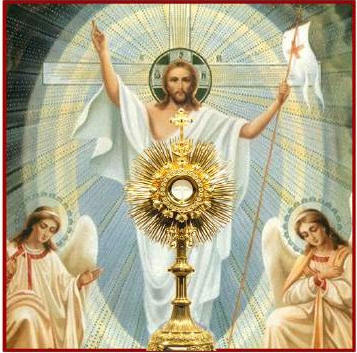The Holy Eucharist is a sacrament of unity yet, we read in today's Gospel: "The people disputed among themselves, saying, 'How can this man give us his flesh to eat?' " (Jn 6: 52) As with the doctrine from last week, of the Holy Trinity, sadly over the centuries Christians have fought and even killed each other on account of their differences. What is the answer? Does this mean that we should do away doctrine and give all opinions equal value? As The Beatles sang: "All you need is love."?
We know that even the closest of Christ's disciples struggled with his teaching: "This teaching is difficult; who can accept it?" (Jn 6: 60) To get rid of doctrine so is to think of worldly categories rather than enter more deeply into the mystery of the Incarnation. St Paul tells us: "Those who are unspiritual do not receive the gifts of God's Spirit, for they are foolishness to them, and they are unable to understand them because they are spiritually discerned." (1 Cor 2: 14) Jesus also says as much when he replies to the disbelieving disciples: "It is the spirit that gives life; the flesh is useless. The words that I have spoken to you are spirit and life." (Jn 6: 63) We cannot reduce the Holy Eucharist to fit our own ideas. We need to focus ourselves on Christ and the entire mystery of his passion, death and resurrection which is made substantially present to us in the sacrifice of the Mass. To receive the Eucharist is an act of faith that places our trust in Jesus himself and the immemorial teachings of the Catholic Church. Jesus asked the twelve, 'Do you also wish to go away?' Simon Peter answered him, 'Lord, to whom can we go? We have come to believe and know that you are the Holy One of God.' " (Jn 6: 67-69)

No comments:
Post a Comment